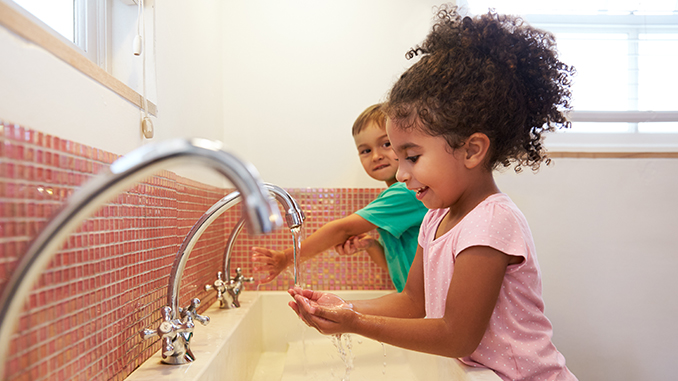
Here are some tips and tricks to make handwashing a fun, family activity.
Published: April 18, 2020
By: Holly Gunn, MD, MPH
We all know the vital role handwashing plays to prevent the spread of COVID-19, germs and bacteria, and to keep all kids and adults healthy. It is important for everyone to make handwashing a regular habit to help keep your loved ones from getting sick. To help parents teach their kids how to wash their hands effectively, here are some tips and tricks to make handwashing a fun, family activity.
What’s the best way to wash your hands?
Starting with the basics, it is important for everyone to wash their hands to remove all potential infections. According to the Centers for Disease Control and Prevention (CDC), here are simple steps to follow:
Wash your hands with lukewarm water. Lather with soap for at least 20 seconds, ensuring that you cover the back and sides of your hands, as well as in between your fingers and under your nails. Rinse in clean water and dry thoroughly. If soap and water are not available then alcohol-based hand sanitizer, with at least 60 percent alcohol, may be used instead. Hands should be rubbed together until the alcohol has dried.
To minimize the risk of spreading germs, wash your hands at times when germs can easily be ingested or transmitted to others, such as before and after eating, handling pets or animals, going to the bathroom, being in a public place, and after coughing, sneezing or blowing your nose.
Tips and tricks for kids
With children being so active, getting them to wash their hands at all can be difficult. Here are some tricks to make handwashing a fun, family activity that kids respond to well:
Take the lead. Wash your hands often, explain the steps you’re taking and why you’re doing them. Make sure not to take shortcuts; if you skip washing the sides of your hands or in between your fingers for example, kids are likely to do the same.
Break out the tunes. If your child won’t stay still for 20 seconds, have them sing a song while they rub their hands together to fill the time. Try a full rendition of “Happy Birthday” or “Mary Had a Little Lamb.” Any song will work so long as your kids can sing for the full time. Try changing the song every week for variety.
Make it a game. Get your little one to count every bubble on their hands or compare who has the largest bubble. You can also start a friendly competition to see who can make as many suds as possible in 20 seconds.
Let your child help pick the soap. If possible, buy a colorful or fragrant soap that features their favorite character so your child will want to use it often.
Be patient. Developing a routine takes time, but once your little one is in the habit of following the necessary steps, they will have this tool in their arsenal for life.
Don’t forget to moisturize. Frequent handwashing may lead to dry, irritated skin that can result in roughness or cracking. If your child has eczema or simply dry skin, moisturizing often will help lock in water and keep their skin hydrated.
As soon as you are finished washing your hands, pat them dry and immediately apply moisturizer. Use thick creams or generic petroleum jelly – these are generally more effective at keeping in moisture than thin lotions.
